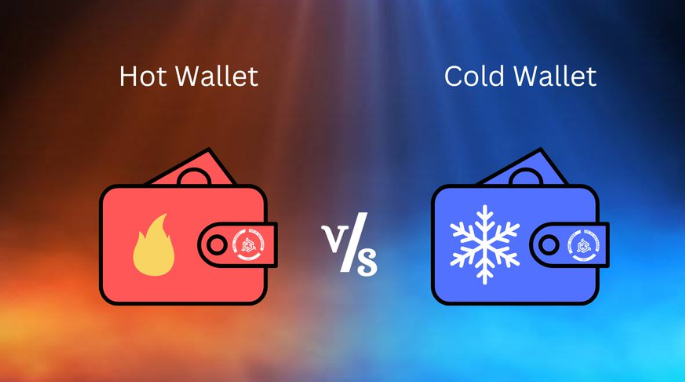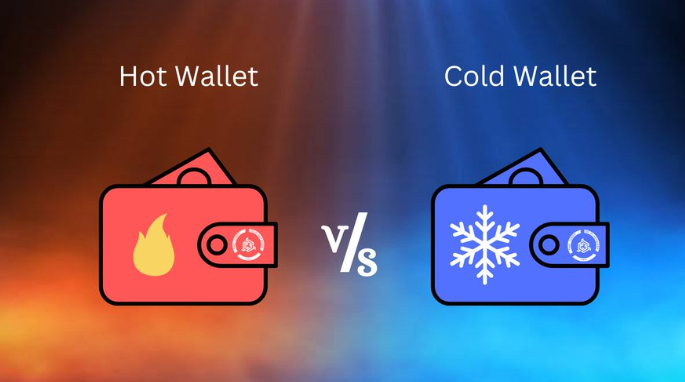The world of cryptocurrency is constantly evolving, and choosing the right wallet in 2025 is more critical than ever. Your crypto wallet is your personal gateway to digital assets, enabling you to store, send, and receive cryptocurrencies and interact with the decentralized web (Web3). This detailed guide will help you understand the different types of wallets and the key factors to consider when making your choice.
Understanding Crypto Wallets: The Basics

At its core, a crypto wallet doesn’t technically “store” your cryptocurrency. Instead, it stores your private keys, which are cryptographic codes that grant you access to your crypto on the blockchain. Losing these keys means losing access to your funds. This fundamental concept is crucial to understanding wallet security and responsibility.
Key Distinctions: Hot vs. Cold, Custodial vs. Non-Custodial
Before diving into specific wallet types, it’s essential to grasp these foundational distinctions:
Hot Wallets vs. Cold Wallets
- Hot Wallets: These wallets are connected to the internet, offering convenience and quick access to your funds. They are ideal for frequent transactions, small amounts, and interacting with decentralized applications (dApps).
- Pros: Easy to use, readily accessible, often free, good for trading and DeFi.
- Cons: More vulnerable to online hacks, malware, and phishing attacks.
- Cold Wallets: These wallets store your private keys offline, providing superior security. They are best suited for long-term storage of significant amounts of crypto (often referred to as “hodling”).
- Pros: Highly secure, immune to online threats, ideal for large holdings.
- Cons: Less convenient for frequent transactions, often come with an upfront cost, can be physically lost or damaged.
Custodial vs. Non-Custodial Wallets
- Custodial Wallets: With a custodial wallet, a third party (like a centralized exchange) holds and manages your private keys on your behalf. This is similar to how a traditional bank holds your money.
- Pros: User-friendly, convenient for beginners, often offer recovery options if you lose your password, may provide additional services like trading or staking.
- Cons: You don’t have full control over your funds, subject to the custodian’s security measures (risk of hacks or frozen accounts), less privacy.
- Non-Custodial Wallets (Self-Custody): You have sole control over your private keys and are entirely responsible for their security and backup (usually via a “seed phrase” or “recovery phrase”).
- Pros: Full control and ownership of your assets, enhanced privacy, access to DeFi and other Web3 functionalities.
- Cons: Greater responsibility for security, loss of seed phrase means permanent loss of funds, can be more complex for beginners.
Types of Crypto Wallets in 2025
Building on the above distinctions, here are the main types of crypto wallets you’ll encounter:
-
Hardware Wallets (Cold Storage, Non-Custodial): These are physical devices (like USB drives) designed specifically to store your private keys offline. They are widely considered the most secure option for significant crypto holdings. Transactions are signed on the device itself, without exposing your private keys to an internet-connected computer.
- Popular options in 2025: Ledger Nano X/S, Trezor Model T/Safe 3, Tangem Wallet, SafePal S1, NGRAVE ZERO, KeepKey, Cypherock.
- Ideal for: Long-term investors, those holding large amounts of crypto, users prioritizing maximum security.
-
Software Wallets (Hot Storage, often Non-Custodial): These are applications installed on your computer, smartphone, or as browser extensions. They offer convenience for everyday transactions and interacting with dApps.
- Desktop Wallets: Installed on your computer (e.g., Exodus, Electrum).
- Mobile Wallets: Apps on your smartphone (e.g., Trust Wallet, Coinbase Wallet, Exodus, Zengo).
- Browser Extension Wallets: Plug-ins for web browsers (e.g., MetaMask, Rabby Wallet, Phantom Wallet).
- Popular options in 2025: MetaMask (Ethereum and EVM-compatible chains), Trust Wallet (multi-chain, mobile-first), Exodus (user-friendly, multi-currency), Coinbase Wallet (non-custodial option from Coinbase), Zengo (seedless MPC technology), Guarda (versatile multi-chain), Electrum (Bitcoin-focused).
- Ideal for: Active traders, DeFi users, NFT collectors, those needing quick access to funds.
-
Paper Wallets (Cold Storage, Non-Custodial): Your private keys and public addresses are printed on a piece of paper. While offering extreme offline security, they are highly susceptible to physical damage, loss, or degradation. They are generally not recommended for most users due to the inherent risks.
How to Choose the Right Wallet in 2025: Key Considerations
Choosing the best crypto wallet depends on your individual needs, how you plan to use your crypto, and your risk tolerance. Here are the crucial factors to weigh:
-
Security (Paramount):
- Private Key Control: Do you want to manage your own keys (non-custodial) or trust a third party (custodial)? For most users, non-custodial is generally preferred for true ownership.
- Offline Storage: For significant holdings, consider a hardware wallet (cold storage) to protect against online hacks.
- Two-Factor Authentication (2FA): Always enable 2FA on any wallet or exchange that supports it (preferably app-based 2FA like Google Authenticator, not SMS).
- Seed Phrase/Recovery Phrase: Understand its importance (your master key!) and how to secure it offline in multiple, separate, physical locations. Never store it digitally or share it.
- Reputation and Audits: Choose wallets from reputable developers with a strong track record and, ideally, open-source code or independent security audits.
- Multi-Party Computation (MPC): Wallets like Zengo use MPC to split private keys, enhancing security by eliminating a single point of failure.
-
Ease of Use & User Interface:
- Beginner-Friendly: If you’re new, opt for wallets with intuitive interfaces and clear instructions (e.g., Coinbase Wallet, Exodus, Trust Wallet).
- Advanced Features: Experienced users might look for features like custom network settings, multi-signature support, and advanced transaction fee controls.
-
Supported Cryptocurrencies & Blockchains:
- Ensure the wallet supports all the cryptocurrencies and blockchain networks you plan to use (e.g., Bitcoin, Ethereum, Solana, Polygon, Binance Smart Chain).
- Multi-chain support is becoming increasingly important in 2025 as the crypto ecosystem expands beyond a few dominant chains.
-
Features & Functionality:
- DeFi Integration: If you plan to engage with decentralized finance (staking, lending, yield farming), choose a wallet with a built-in dApp browser or seamless integration with DeFi platforms (e.g., MetaMask, Trust Wallet, Phantom, Coinbase Wallet).
- NFT Management: For NFT collectors, a wallet that allows easy viewing, sending, and managing of NFTs is essential (e.g., Exodus, Zengo, MetaMask, Trust Wallet, Phantom).
- Staking: Some wallets allow you to stake certain cryptocurrencies directly from the wallet to earn rewards.
- Built-in Exchange/Swaps: For convenience, some wallets offer integrated swap functionalities, allowing you to exchange one crypto for another without leaving the wallet.
- WalletConnect: Essential for connecting your mobile or hardware wallet to dApps on desktop browsers.
-
Cost:
- Hardware Wallets: Involve an upfront purchase cost (ranging from $50 to $300+).
- Software Wallets: Generally free to download and use, but you will pay network transaction fees (gas fees) when sending crypto or interacting with dApps.
-
Customer Support & Community:
- Look for wallets with responsive customer support and active communities that can provide assistance if you encounter issues.
Hybrid Approach: The Smart Strategy
Many experienced crypto users adopt a hybrid approach to maximize both security and convenience:
- Long-Term Holdings/Large Amounts: Store the majority of your crypto in a hardware wallet (cold storage) for maximum security.
- Active Trading/DeFi/NFTs: Keep a smaller, “spending” amount in a software wallet (hot wallet) for quick access and interaction with dApps and marketplaces.
Final Tips for 2025
- Do Your Own Research (DYOR): Always research any wallet thoroughly before trusting it with your funds. Read reviews, check security audits, and understand the company behind it.
- Start Small: If you’re new, begin with a small amount of crypto to get comfortable with the wallet’s functionality before transferring larger sums.
- Practice Security Habits:
- Never share your seed phrase with anyone.
- Beware of phishing scams and fake websites/apps. Always double-check URLs.
- Use strong, unique passwords and enable 2FA wherever possible.
- Regularly update your wallet software to benefit from the latest security patches.
- Back up your seed phrase multiple times in secure, offline locations.
- Consider a passphrase in addition to your seed phrase for an extra layer of security on hardware wallets.
Conclusion:
In 2025, the crypto wallet landscape is defined by a crucial balance between security, convenience, and expanding functionality. As the cryptocurrency market matures and integrates further with traditional finance and the broader digital economy, the choice of a wallet becomes increasingly strategic.
The trend clearly favors self-custody for anyone serious about digital assets, with hardware wallets remaining the gold standard for long-term, high-value storage. However, software wallets are rapidly evolving, driven by advancements in AI-powered insights, biometric security, seamless cross-chain interoperability, and integration with the burgeoning Metaverse and Web3 ecosystems. Features like Multi-Party Computation (MPC) are also enhancing security for hot wallets, offering a middle ground that simplifies key management while maintaining self-custody.
The increasing adoption of cryptocurrencies for payments, DeFi, and NFTs means that your wallet is no longer just a storage device; it’s your primary gateway to the decentralized internet. Factors such as regulatory clarity, technological breakthroughs, and institutional interest are all contributing to the mainstreaming of crypto, making reliable and user-friendly wallets more essential than ever.
Ultimately, the “right” wallet in 2025 is a personal decision that requires a careful assessment of your individual needs, risk tolerance, and engagement with the crypto ecosystem. A hybrid approach, combining the robust security of a hardware wallet for your primary holdings with the accessibility of a feature-rich software wallet for daily interactions, will likely remain the most prudent strategy for most users navigating this dynamic and exciting space. As the market continues to innovate, staying informed about the latest security practices and wallet advancements will be key to safeguarding your digital assets and maximizing your participation in the decentralized future.
Ready to start your cryptocurrency journey?
If you’re interested in exploring the world of crypto trading, here are some trusted platforms where you can create an account:
🔹 Binance – A global leader in cryptocurrency trading.
🔹 Bybit – A user-friendly platform for both beginners and advanced traders.
These platforms offer innovative features and a secure environment for trading and learning about cryptocurrencies. Join today and start exploring the opportunities in this exciting space!
🚀 Want to stay updated with the latest insights and discussions on cryptocurrency?
Join our crypto community for news, discussions, and market updates: OCBCryptoHub on Telegram.
📩 For collaborations and inquiries: datnk710@gmail.com
Disclaimer: Always do your own research (DYOR) and ensure you understand the risks before making any financial decisions.




